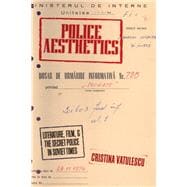
Note: Supplemental materials are not guaranteed with Rental or Used book purchases.
Purchase Benefits
What is included with this book?
| Acknowledgments | p. ix |
| Introduction | p. 1 |
| Zones of Contact: Literature, Film and the Secret Police | p. 1 |
| Reading a Secret Police File | p. 11 |
| "Police Aesthetics," | p. 20 |
| The Road Plan | p. 24 |
| Arresting Biographies: The Personal File in the Soviet Union and Romania | p. 27 |
| Preamble: Fragmentary Archives | p. 27 |
| A Short Genealogy of the Secret Police File | p. 32 |
| Surveillance Files: Characterization Through Collation | p. 34 |
| Investigation Files: From Autobiography to Confession | p. 39 |
| Stalinist Files: How Many of Those Enemies Were Forged | p. 41 |
| Post-Stalinist Files: The Age of Surveillance | p. 46 |
| A Note on Foucault | p. 53 |
| The Master and Margarita: The Devil's Secret Police File | p. 55 |
| The Distinguishing Characteristics of the Devil in 1930s Moscow | p. 56 |
| Writer Prototypes: Madmen, Apostles, and Secret Police Investigators | p. 59 |
| Censorship and the Authority of the Word | p. 63 |
| Stalinist "Fantastic Reality" and Its Textual Practices | p. 68 |
| Mikhail Bulgakov's Personal File | p. 69 |
| Repetitions with Suspect Differences: The Writer as Copyist | p. 72 |
| Early Soviet Cinema's Shots at Policing | p. 77 |
| Filmmaking and Fingerprinting: Dziga Vertov's Film Theory and Practice | p. 78 |
| Hidden and Artfully Exhibited Cameras | p. 85 |
| The Original Show Trial Film and Its Audience | p. 88 |
| Alexander Medvedkin: Cinema as Public Prosecutor | p. 92 |
| The Indistinguishable Crowd: Criminal Challenges to Vision and Visual Technologies | p. 99 |
| The Forged Party Card: Detaching Photographs, Names, and Identities | p. 103 |
| Vigilance: The Look of High Stalinism | p. 108 |
| Legitimizing Cinematic Vision: Socialist Realism, Depth Style and The Party Card | p. 110 |
| Stalin as Scriptwriter and His Chekist Protagonist | p. 114 |
| Melodrama and the Police | p. 115 |
| Vision, Visual Technologies, and Policing | p. 118 |
| The Many Ways Film Directors Took Shots at Policing | p. 121 |
| Secret Police Shots at Filmmaking: The Gulag and Cinema | p. 123 |
| The Camp as Soviet Exotica: Solovki | p. 124 |
| An OGPU Blockbuster: Road to Life | p. 135 |
| Discipline, Punishment, and a New OGPU Experiment | p. 137 |
| Film Techniques and Secret Police Tactics | p. 140 |
| Violence and Stylistic Innovation | p. 144 |
| Interpellating a Dubious Public: The Belomor Project | p. 147 |
| Multimedia Portraits of the Camp Inmate | p. 152 |
| Belomor's Femininity: The Prostitute and the Shock Worker | p. 153 |
| The Place of the Arts in the Belomor Project | p. 157 |
| Literary Theory and the Secret Police: Writing and Estranging the Self | p. 161 |
| Two Masters of Estrangement: Lev Tolstoy and Ivan the Terrible | p. 163 |
| Revolutionary Estrangement and the Explosion of the Self | p. 165 |
| Self-Estrangement and Self-Effacement | p. 167 |
| Deposition and Autobiography: An Estranging Encounter | p. 169 |
| "This is surrealism": Estrangement in the Interrogation Room | p. 173 |
| Eulogy to the Lie: Self-Estrangement and Reeducation | p. 181 |
| Concluding Thoughts | p. 187 |
| Notes | p. 199 |
| Index | p. 239 |
| Table of Contents provided by Ingram. All Rights Reserved. |
The New copy of this book will include any supplemental materials advertised. Please check the title of the book to determine if it should include any access cards, study guides, lab manuals, CDs, etc.
The Used, Rental and eBook copies of this book are not guaranteed to include any supplemental materials. Typically, only the book itself is included. This is true even if the title states it includes any access cards, study guides, lab manuals, CDs, etc.